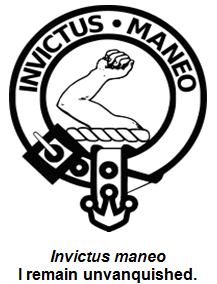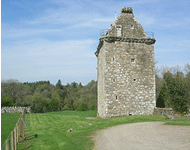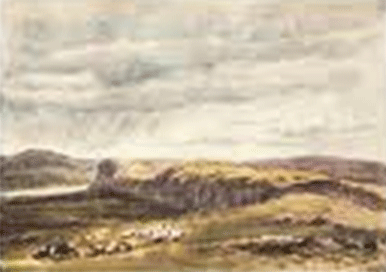Armstrong

-
Clan Territory:
The Scottish Borders -
Clan Chief:
The last Chief of Clan Armstrong - Archibald Armstrong of Mangerton – was hanged around 1610 for leading a cattle raid on Penrith. -
Clan Castle:
 Gilnockie Tower is on the west bank of the River Esk. Gilnockie Castle is a nearby ruin. The tower was built around 1520 by Johnnie Armstrong,
burned, rebuilt, damaged by English raids and rebuilt for a third time. In 1978 the tower was restored from a roofless ruin.
Gilnockie Tower is on the west bank of the River Esk. Gilnockie Castle is a nearby ruin. The tower was built around 1520 by Johnnie Armstrong,
burned, rebuilt, damaged by English raids and rebuilt for a third time. In 1978 the tower was restored from a roofless ruin.
-
Clan History:
So heinous were the Armstrong crimes that, in 1524, the Bishop of Glasgow issued a curse, which was read from pulpits, across Scotland. The curse ran for 1500 words.
"I curse their heid and all the haris of thair heid; I curse thair face, thair ene, thair mouth, thair neise, thair tongue, thair teeth, thair crag, thair shoulderis, thair breist, thair hert, thair stomok, thair bak, thair wame, thair armes, thair leggis, thair handis, thair feit, and everilk part of thair body, frae the top of their heid to the soill of thair feet, befoir and behind, within and without..."
Translation - "I curse their head and all the hairs of their head; I curse their face, their eyes, their mouth, their nose, their tongue, their teeth, their neck, their shoulders, their breast, their heart, their stomach, their back, their belly, their arms, their legs, their hands, their feet, and each and every part of their body, from the top of their head to the soles of their feet, before and behind, within and without ..."

Crag Loch by James Orrock, from In The Border Country
Armstrong origins are surrounded in mystery. Their name is supposed to have come from Fairbairn, who, dressed in armour, lifted the king onto his own horse with one arm during the Battle of the Standard at Northallerton in Yorkshire in 1138 after the king's horse had been killed in battle, though the first written reference linking Armstrongs and the Borders is in a Carlisle court record of 1236 where Alan Armstrong is excused for killing a man.
The family seat was in Liddesdale, the valley of the Liddel Water in Southern Scotland, but before long they expanded into Eskdale and Annandale. By the time the bishop cursed them they could muster 3000 horsemen.

The Eildon Hills by James Orrock, from In the Border CountryIt's easy to romanticise the men who became known as the Border reivers, to make them out to be proud and independent horsemen who challenged authority. But you can’t go around committing murder, burning houses and stealing cattle for a couple of hundred years without making enemies and one source tells us that "if Jesus Christ were among them, they would deceive him" – and history supports this assertion.
The reivers ignored royal authority. And such was the Armstrong reputation and power that in 1529 the King of Scots himself, King James V promised Johnnie Armstrong of Gilnockie safe conduct, invited him to join a hunting party then abandoned his promise.

One of the finest Border ballads tells how Johnnie Armstrong pleaded for his life and when it was refused said:
To seek hot water beneath cold ice,
Surely it is a great folly -
I have asked for grace at a graceless face,
But there is none for my men and me!
And before the century was out another Armstrong provided the plot for another Border ballad when William Armstrong of Kinmont Tower – Kinmont Willie – was ambushed during a truce and taken to Carlisle Castle where he was rescued by Sir Walter Scott of Buccleuch.

Carlisle Castle, from The Antiquities of England and Wales, Francis Frosse (1783)
The story of the Armstrongs, the Border reivers, Johnnie Armstrong, Kinmont Willie and many other clan notables, as well as how Union with England brought peace to the Scottish Borders is told in the Galloglas DVD, Clan Armstrong.
Filmed on location to the highest standards Clan Armstrong features unique stories that interweave romance, murder and betrayal, set against a stunning landscape. (Coming Soon) -
Famous Armstrongs:
Sir Alexander Armstrong, Arctic explorer.
Louis Armstrong, "Satchmo" trumpeter, singer and one of the most influential jazz musicians.
Neil Armstrong, the first man on the moon.
-
And finally:
Are Armstrongs a clan?
In 1587 the Scottish Parliament passed an Act "for the quieting and keeping in obedience of the ... inhabitants of the Borders, Highlands and Isles". The Act lists "the clans that have Captains, Chiefs and Chieftans." So, in the 16th century the Scottish Parliament did not restrict clans to the Highlands of Scotland and included Border families in their description.